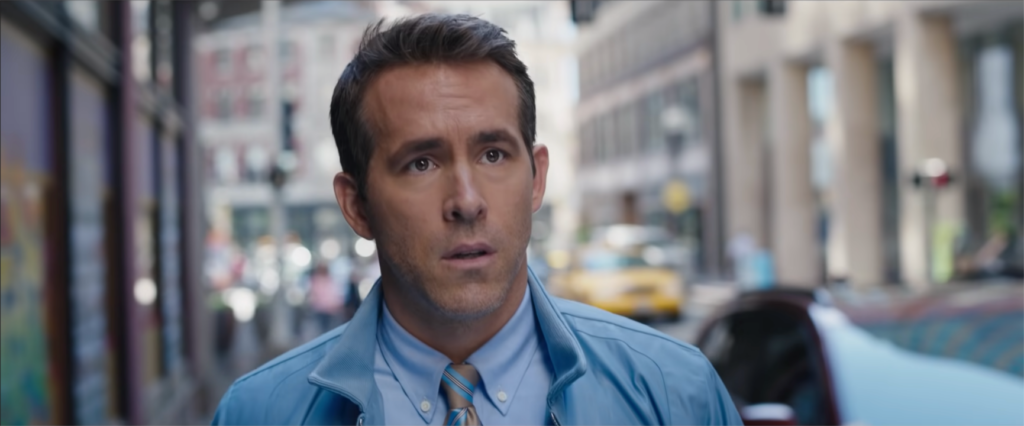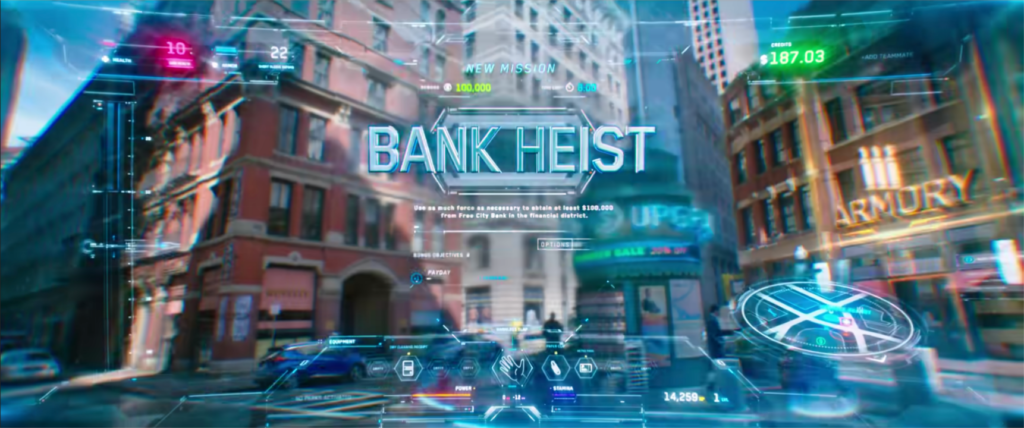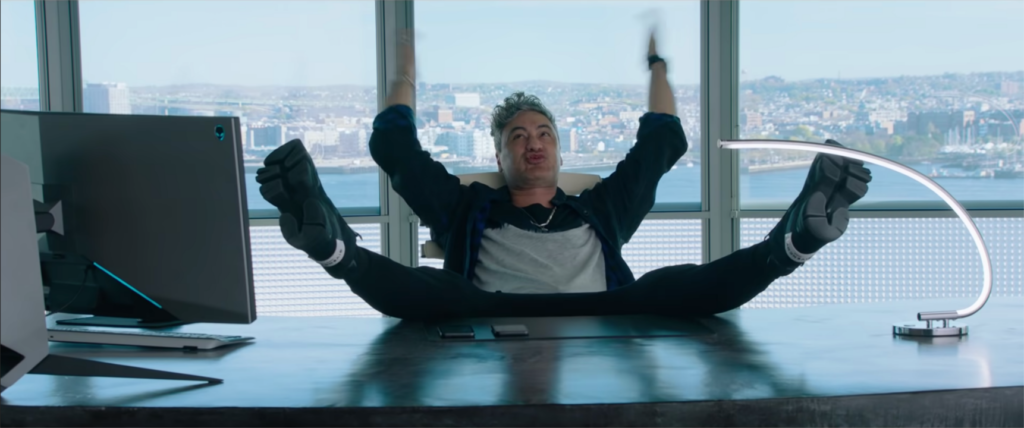Free Guy is an action comedy film about a non-player character in a Grand Theft Auto-esque videogame world who suddenly gains sentience. Guy (Ryan Reynolds) lives a blissfully empty life in Free City, oblivious to the nature of his existence and the world he lives in. One day when coming home from work, Guy passes a beautiful woman on the street. He breaks his pre-programmed daily routine to follow her and finds his existence spiraling into something much greater.

Guy’s infatuation causes problems for him because his crush, Molotovgirl, is wearing sunglasses. Those who wear sunglasses are player characters, the avatars of people in the real world who enter Free City to cause destruction. They rob banks and convenience stores, crash cars and helicopters into buildings, and murder NPCs and each other indiscriminately with an array of fantastic weaponry.
Disturbed by the chaos he was once oblivious to, Guy steals a pair of sunglasses from a player and through them sees the videogame systems that make Free City into a violent playground. Incensed that his friends and neighbors are victimized by the players, and also hoping to impress Molotovgirl who dismisses him as a level 1 newbie, Guy starts fighting back, turning Free City’s systems against the players.

Free Guy’s particular strength is that it understands videogames and assumes that the viewer will too. A character explaining that “NPC” means “non-player character” to a colleague who should know that is the only time I rolled my eyes at the dialog. Some of the rules aren’t entirely clear—the penalty for a player character’s death is vague enough to be menacing without getting into specifics, and why exactly do the sunglasses work for NPCs?—but the plot doesn’t grind to a halt to explain these plot conveniences.
Free Guy shows remarkable restraint in referencing existing videogames when it easily could have gone overboard. Free City is undoubtedly inspired by Grand Theft Auto Online. The player character’s wacky outfits and compulsive use of random gestures and dances recalls Fortnite. But the film wisely saves most of its overt references for a single moment in the climax when Guy unleashes a string of pop culture weapons in rapid succession. It makes for a great joke in the moment and otherwise doesn’t exhaust me looking for easter eggs when I should be focusing on characters and plot.

Where Free Guy does freely dip into videogame culture is its villain, Antwan (Taika Waititi) and his company Soonami. Soonami’s elaborate offices have an open floor plan, a glass-walled kitchenette filled with snacks, and a floor-to-ceiling high definition display in its massive lobby forever looping a video of crashing waves. Its excesses make me recall Ion Storm and its infamous office space rented by John Romero early in his career simply to show off how rich and famous he was.
Antwan is an eccentric tyrant played with manic intensity by Waititi, sweeping into rooms and acting like he has immediately become the center of attention. He is alternately dismissive and abusive of his employees. He shouts orders across the room at the entire art department, and when told that his request contradicts something he previously promised, declares he changed his mind and never told anyone.

He is similarly scornful towards the players. When Guy’s adventures in Free City begin to interfere with how people play the videogame—and, probably more importantly, how they continue to feed money into it—Antwan goes to increasingly more disruptive means to stop him. He seems genuinely unaware that his behavior only makes Guy more popular to his growing number of fans.
Antwan is as harsh and broad a depiction of an abusive AAA videogame executive as could be depicted in this PG-13 action film. He’s never seen sexually assaulting anyone on screen, but I wouldn’t put it past him. It speaks volumes how he takes advantage of the women around him with rage and bluster, but encourages a talented man working in QA to move up to the coding department, his sole moment of quiet sincerity. His name is Antwan, but it could easily be Kotick, or Brack, or Guillemot, or Hascoët, or Pitchford, or…
As with Free City, Antwan’s behavior and the culture at Soonami shows that the film understands videogames, albeit in a sinister way instead of an affectionate one. Antwan is wholly uninterested in videogames as an artform or as escapist entertainment. He sees them only as a profitable enterprise and a corporate playground where he can be a toxic bully.

Then there’s Millie and Keys (Jodie Comer and Joe Keery), two indie videogame developers whose groundbreaking social simulator gets bought out and buried by Antwan. They spend the film trying to prove their code serves as the basis for Free City, with Millie acting within the videogame world as Molotovgirl and Keys strongarmed into working as a mole at Soonami’s offices.
Millie and Keys are the weakest part of the film. Their subplot exists entirely to explain how Guy becomes self aware, a question that would have been more interesting if it remained unanswered. More frustrating, Guy’s freedom becomes wrapped up in the Millie and Keys plot, making him a supporting character in a climax where he does all the work.
The conclusion to their arc feels forced. Keys is yet another awkward nerdy nice guy who gets everything he wants by doing nothing except hang around being awkward and nerdy and nice. I didn’t believe Millie’s last minute realization, and I didn’t believe Guy’s part in sparking that realization. I didn’t believe it so much that I expected a comedic subversion, but it never came. Free Guy, for all its irreverence, plays its forced love triangle subplot sappily straight.

What surprised me most about Free Guy is how much it works as a remake of The Truman Show for the Millennial and Gen-Z generations. A small mishap in Guy’s ordered life sets off a chain reaction that reveals a masquerade and completely changes who he is—or rather, helps him to become who he secretly always was. His crusade across Free City as a “good guy” makes him surprisingly popular around the world and the film occasionally cuts away for commentary from streaming personalities (including Tyler “Ninja” Blevins which significantly deadens Antwan’s scathing representation of videogame executives). The story’s climax even involves a thrilling race across a previously-impassable ocean.
Where Free Guy makes a misstep compared to The Truman Show is it doesn’t know when to stop. It feels like a pre-emptive response to the overly-involved internet reviewing community (which I realize this review is a part of), where things left intentionally unexplained or mysterious are singled out as “plot holes” which can be tallied on a scorecard and rendered as a verdict against the film. I don’t care to know how Guy achieved sentience, just what he does with it. And I further don’t care to know what happens to Millie and Keys in the end—and I don’t believe it when I do.
I still had a fun time with Free Guy and it’s an easy recommendation for anyone looking for a film that has something thoughtful to say about videogames and videogames culture.